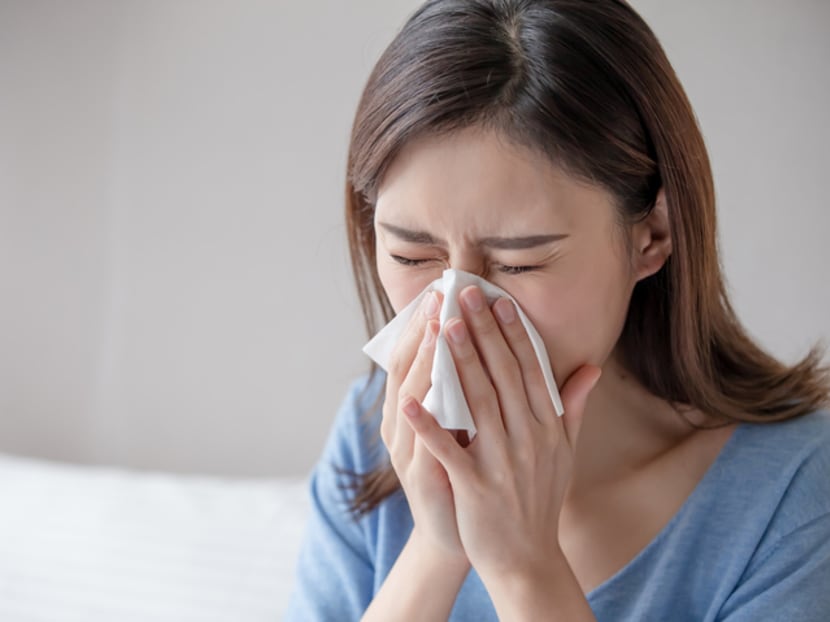Covid-19 restrictions may have left S’poreans with lower immunity to seasonal flu, common colds: Study
SINGAPORE — A study has found that the Singapore population might be susceptible to getting the seasonal influenza and common colds when Covid-19 restrictions further relax. This is after a year of mask-wearing, physical distancing and travel restrictions, which may have lowered both the incidence of these illnesses and the population’s immunity against them.

Researchers who did study are uncertain if the further lifting of Covid-19 restrictions in Singapore will cause an outbreak of seasonal influenza.
- Researchers noted the most substantial dip in flu infections during the circuit breaker period from April to June last year
- Restrictions such as mask-wearing, social distancing and reduced travel may have reduced people’s exposure to various viruses such as flu
- Influenza A/B, which causes the seasonal flu, was nearly absent for the second half of 2020
- This reduced exposure to flu may mean reduced immunity among the Singapore population, said researchers
- People are advised to get the flu vaccination in addition to the Covid-19 jab
SINGAPORE — A study has found that the Singapore population might be susceptible to getting the seasonal influenza and common colds when Covid-19 restrictions further relax. This is after a year of mask-wearing, physical distancing and travel restrictions, which may have lowered both the incidence of these illnesses and the population’s immunity against them.
Researchers said, though, that it is uncertain if the lifting of these restrictions may ignite an outbreak of the flu when these viruses return to the community.
Experts are recommending people get the flu vaccination in addition to the Covid-19 vaccines.
Dr Matthias G Maiwald, head consultant of microbiology service at KK Women’s and Children’s Hospital (KKH) and one of the study’s authors, said that common cold infections, while unpleasant, are important to retain immunity levels.
“They are not all that bad because common cold infections help keep our immunity trained, so to speak,” he said at a media briefing on Thursday (Nov 11).
“And if that training of the immunity is absent during 2020 or 2021, there is a chance that our immune system is less prepared for a return infection.”
Dr Maiwald is one of the researchers from Singapore General Hospital (SGH), KKH and Genome Institute of Singapore, who examined data of more than 42,000 polymerase chain reaction tests for respiratory viruses performed across three public hospitals in 2019 and 2020.
They collated weekly numbers of tests and positive results for the various viruses to assess trends in respiratory virus infections during the Covid-19 pandemic in Singapore.
The study found that flu activity was at its peak in December 2019 and January 2020, with nearly 30 cases for every 100 samples.
They saw a decline in flu infections in February and March last year, after the Disease Outbreak Response System Condition (Dorscon) alert level here turned orange, with just about two cases for every 100 samples.
In declaring Dorscon orange, the Government introduced various restrictions and recommendations, such as temperature screening, a suspension of external activities by schools and advice to cancel large-scale events.
The most substantial dip in flu infections was during the circuit breaker or semi-lockdown in April and May last year, so much so that influenza A/B — the cause of seasonal flu — was nearly absent for the remainder of 2020.
The circuit breaker restrictions largely confined most people, aside from essential workers, to their homes.
Singapore typically has two flu seasons — from December to February, and May to July — which generally coincide with the school holidays when families travel overseas.
The researchers said that although the seasonal flu has remained low, some flu viruses rebound earlier despite continued mask-wearing.
This is in the case of the enterovirus and rhinovirus — a major cause of the common cold among children — which re-emerged during the second phase of the reopening of the economy after the circuit breaker, in the second half of 2020.
Dr Wan Wei Yee, a senior consultant at SGH’s department of microbiology said that this could be attributed to children being less compliant with health regulations and hygine precautions.
“They like to touch everything, every surface, they put things in their mouths, they hug people. This behaviour, as well as the relaxed social measures, probably contributed to (this resurgence),” she added.
The researchers thus urged the public, even people who have recovered from Covid-19, to get their flu vaccine before the start of the flu season, in addition to the Covid-19 vaccines.
Dr Maiwald said: “If you had Covid-19, it does not confer a known cross-protection towards common cold viruses. The situation with the common cold viruses is specific because there are plenty of them, so you are protected only against the common cold you already had.”











